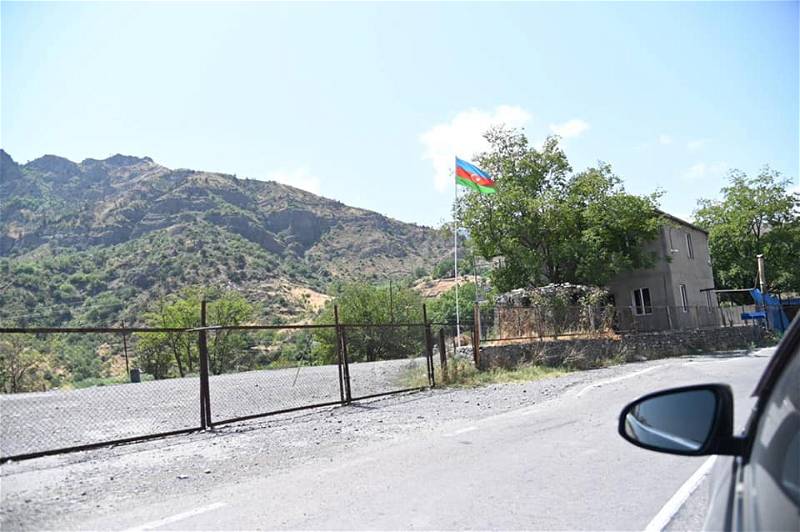YEREVAN—Armenian Prime Minister Nikol Pashinyan has announced his plans for a meeting with the president of Azerbaijan to discuss a durable peace agreement, a few weeks after Azerbaijani forces took control of Artsakh.
In an interview with Armenian Public TV on Tuesday, Pashinyan claimed that the principles for negotiation were set in Granada and that the suggested meeting in Brussels must follow the same principles. “When Aliyev tries to suggest another platform for negotiations, it neutralizes the agreed upon principles,” said Pashinyan.
The announcement comes a week after Azerbaijan’s President Ilham Aliyev pulled out of an EU-brokered meeting with PM Pashinyan in Granada, Spain on October 5. Aliyev had requested the presence of Turkey at the meeting, to which France and Germany objected. Aliyev stated that Baku felt “an anti-Azerbaijani atmosphere” had developed among the meeting’s potential participants and refused to participate.
During his interview on Tuesday, Pashinyan said that the meeting in Granada delivered two important statements with European leaders: a quadrilateral statement with French President Emmanuel Macron Macron, German Chancellor Olaf Scholz and European Council President Charles Michel and a bilateral statement with the President of the European Commission Ursula von der Leyen.
These statements highlight the deepening relations between Armenia and the EU. Pashinyan asserts that these statements outline the pillars of “peace” in the region, including mutual recognition of territorial integrity, delimitation of borders based on the Alma Ata declaration and USSR maps, and the unblocking of communications under the protection of sovereignty, jurisdiction, equality and reciprocity. However, Aliyev’s decision not to attend the meeting and refusal to recognize the territorial integrity of Armenia complicate prospects for the protection of sovereignty, equality and any sort of reciprocity.
The quadrilateral statement signed by Pashinyan in Granada recognizes 86.6 thousand square kilometers of Azerbaijani territory, which includes not only Artsakh but also the enclaves liberated during the First Artsakh War. While the Prime Minister’s press office has denied these allegations following the meeting in Granada, Pashinyan stated that the 86.6 thousand square kilometers include these enclaves during a press conference in May 2023.
Indeed, the recent phone conversation on October 7 between Aliyev and Michel highlighted the ongoing territorial disputes between Armenia and Azerbaijan. President Aliyev reiterated the presence of eight occupied Azerbaijani villages in Armenia and emphasized the importance of liberating these areas.
During the first Artsakh War in the 1990s, Armenia liberated approximately 60 square kilometers of land from Azerbaijan. This included the enclaves of Verin Voskepar, Tigranashen, Sofulu and Barkhudarlu, as well as several villages near Baganis in the Tavush region and a small area near Sarigyugh. Conversely, Azerbaijan seized around 71 square kilometers of territory from Armenia, including Artsvashen (51 square kilometers), the village of Berkaber (12 square kilometers), and territory near Sevkar in the Tavush region (about 5 square kilometers).
The enclaves controlled by Armenia hold significant strategic importance for the modern Armenian state. Tigranashen is crucial as it lies on the interstate highway connecting central Armenia with Syunik, Artsakh and Iran. Losing Tigranashen would limit Armenia’s access to Artsakh and Iran, with only one exit through the village of Vedi. This would allow Azerbaijan to launch attacks on central Armenia and potentially isolate Syunik. Additionally, the Voskepar enclave is vital as it hosts the gas pipeline from Georgia to Armenia, and losing control over it would pose risks and potentially lead to an energy blockade.
A few days after the summit in Granada, Aliyev said France would be to blame for any new conflict between Armenia and Azerbaijan, following Paris’ promise to deliver military equipment to Armenia last week. “The provision of weapons by France to Armenia was an approach that was not serving peace, but one intended to inflate a new conflict, and if any new conflict occurs in the region, France would be responsible for causing it,” said Aliyev.
Following Aliyev’s statement regarding the enclaves, in an interview with Brussels Signal, Armenia’s ambassador-delegate to the EU Davit Balayan said that Armenia expects Azerbaijan to invade within a few weeks. According to Balayan, Azerbaijan may not stop at the capitulation of Artsakh and could potentially launch an attack on Armenia itself. Balayan expressed concern that President Aliyev’s expansionist plans have not faced any concrete repercussions. He emphasized the need for practical steps from the collective West to confront Azerbaijan and prevent further aggression.
Armenia says that President Aliyev intends to target the “Zangezur” corridor, which refers to the strategic transportation route extending from the Azerbaijani capital of Baku to Kars, Turkey’s eastern province, passing through sovereign Armenian territory in the Syunik province near the country’s border with Iran. Balayan suggested that the EU should set a deadline for Aliyev to withdraw his army from the Armenian border region and consider suspending Azerbaijan’s visa-free travel agreement. He also mentioned that individual sanctions could send a clear message.
In parallel to the peace process brokered by the European Union led by France, other major players in the region continue their efforts. In an interview with Russian RBC news, Russian Deputy Foreign Minister Mikhail Galuzin noted that Moscow is considering the possibility of a meeting between the foreign ministers of Russia, Armenia and Azerbaijan at the CIS summit in Bishkek on October 13.
Galuzin expressed hope for continued dialogue between the three countries and emphasized the importance of Armenian participation in the negotiations. He also discussed the potential for cooperation between Russia, the U.S. and the European Union in normalizing Armenian-Azerbaijani relations, highlighting the need to acknowledge the progress made through Moscow’s mediation. However, the office of the Armenian Prime Minister said that Pashinyan will not travel to Bishkek to participate in the CIS summit.
Source : Armenian Weekly


